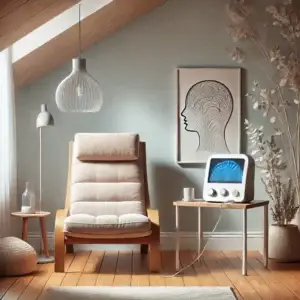Are you ready for a wild ride through the wacky world of sleep deprivation? Buckle up, because we’re about to explore what happens when we don’t get enough Zzzs!
When we sleep, it’s like our body throws a big party and invites all our favorite hormones and chemicals to come and play. We’ve got serotonin, the happy hormone, and melatonin, the sleepy hormone, all having a good time together.
But when we don’t get enough sleep, it’s like some of the party guests didn’t show up. Maybe melatonin got lost on the way, or serotonin decided to stay home and watch TV. Whatever the reason, the party just isn’t as fun without all our favorite hormones there.
So what happens when we have a lack of sleep? Well, for starters, we might feel grumpy and irritable, like we woke up on the wrong side of the bed. Our memory and concentration might also suffer, like we’re trying to think through a thick fog.
But that’s not all – our body might also start doing some wacky things. Maybe we’ll start craving junk food, or our skin might break out in a rash. It’s like our body is throwing a tantrum, saying “Hey, I need my beauty sleep, give me a break!”
The Importance of Sleep for Our Health
Before diving into the health problems that arise from sleep deprivation, let’s first understand why sleep is essential for good health. When we sleep, our bodies work to repair and restore our cells and tissues. Sleep helps regulate our immune system, controls our hormones, and ensures our brain functions optimally. When we don’t get enough sleep, these essential processes are disrupted, leading to a range of health problems.
If I Don’t Get Enough Sleep What Health Problems Will I Have?
The consequences of sleep deprivation can be far-reaching and severe. Here are some of the health problems you could face if you don’t get enough sleep:
1. Weakened Immune System
If you don’t get enough sleep, your immune system becomes compromised, making you more susceptible to illnesses. Your body’s ability to fight off infections, such as the common cold and flu, is reduced. Inadequate sleep can also lead to chronic diseases such as diabetes, heart disease, and obesity.
2. Weight Gain and Obesity
Lack of sleep can also contribute to weight gain and obesity. When we don’t get enough sleep, our hormones that regulate appetite and satiety are disrupted, leading to increased food cravings and overeating. Moreover, we tend to choose unhealthy, calorie-dense foods when we’re sleep-deprived, which can lead to weight gain.
3. Mental Health Problems
Insufficient sleep can also impact our mental health. Sleep deprivation can make us more prone to depression, anxiety, and mood swings. It can also affect our cognitive function, leading to memory problems, difficulty concentrating, and impaired decision-making.
4. Cardiovascular Disease
Sleep deprivation can also put us at a higher risk of developing cardiovascular disease. Lack of sleep can lead to high blood pressure, inflammation, and atherosclerosis, which can eventually lead to heart attacks and strokes.
5. Reduced Libido
Sleep plays an essential role in regulating our hormones, including those that affect our sex drive. When we don’t get enough sleep, our libido can take a hit, leading to reduced sexual desire.
6. Poor Vagal Tone
A lack of sleep can negatively impact vagal tone. Vagal tone refers to the activity level of the vagus nerve, which plays a crucial role in regulating the body’s relaxation response, heart rate, digestion, and other bodily functions. Sleep deprivation or insufficient sleep can disrupt the balance of the autonomic nervous system, leading to a decrease in vagal tone.
Research has shown that sleep deprivation can result in reduced parasympathetic nervous system activity, which is primarily mediated by the vagus nerve. This can lead to an imbalance between the sympathetic (fight-or-flight) and parasympathetic (rest-and-digest) branches of the autonomic nervous system.
A decrease in vagal tone can have various negative effects on physical and mental health, including increased stress levels, impaired emotional regulation, higher inflammation levels, and greater susceptibility to anxiety and mood disorders.
Therefore, prioritizing healthy sleep habits and ensuring an adequate amount of quality sleep is essential for maintaining optimal vagal tone and overall well-being.
FAQs about Sleep Deprivation and Health
Q: How much sleep do I need?
A: The amount of sleep needed varies from person to person. However, most adults need 7-9 hours of sleep per night.
Q: What can I do to improve my sleep?
A: Here are some tips to improve your sleep:
- Establish a regular sleep schedule
- Avoid caffeine, nicotine, and alcohol before bedtime
- Create a relaxing sleep environment
- Avoid using electronic devices before bedtime
- Exercise regularly
Q: Can I catch up on lost sleep?
A: Yes, you can catch up on lost sleep. However, it’s essential to establish a regular sleep schedule to prevent sleep debt from building up.
Conclusion
Sleep deprivation can critically impact your physical and mental health. If you don’t get enough sleep or you suffer from sleep deprivation, you’ll face various health problems that can significantly impact your quality of life. From weakened immune systems to weight gain, mental health problems, and cardiovascular disease, the consequences of skimping on sleep can be severe.
Do some research on The Hidden Pharmacy Of The Brain to improve the quality of your sleep through the power of the mind. It could pay some big dividends.
Remember that when we suffer from sleep deprivation, it’s like our body is throwing a party with some of the guests missing. We might feel grumpy, forgetful, and maybe even a little bit wacky. So be sure to catch those Zzzs and keep the party going strong!
For additional information, check out The Health Nerd’s video on The Importance of Sleep.






